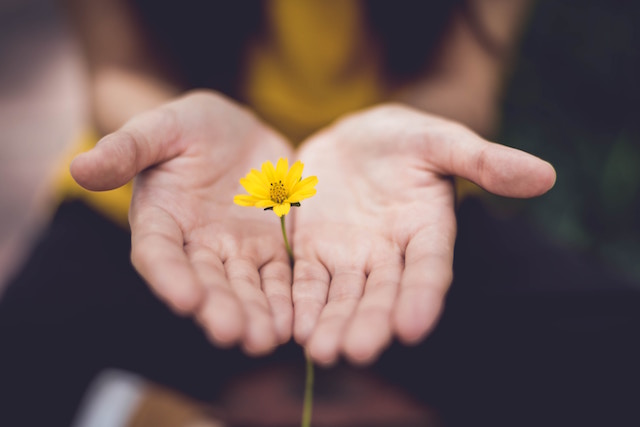Let the journey of self-discovery enrich your life...
This is the third post in the series “Grief: A Mother’s Journey.” I want to thank Laura for her courage, compassion, and honesty in writing these pieces. I hope that they are found by those of you who need them most.
-Rich Nicastro, PhD
Honoring Yourself Through Your Bereavement
I imagine that on any given day, thousands of women across the globe are getting mammograms. Hundreds of thousands. Millions, maybe. No one thinks of it as a pleasant experience; quite the contrary, especially if it’s other than routine and is likely to result in bad news. But we do it anyway. Even though the mammogram itself is uncomfortable, it’s an example of self-care.
We can all see that, right? That getting screened for illnesses is a means of taking care of oneself.
It’s much harder, I think, to identify the self-care element in decisions involving mental health. Sometimes we tend to dismiss mental health as unreal somehow, or at least prioritize it below physical health. That’s been my experience, anyway.
Let me be more specific.
And let me ask you: what do you think you owe the world? (By “the world,” I mean people you don’t know well, people who aren’t family or close friends.)
And what do you owe yourself?
I asked myself these things a couple of days after I had a screening mammogram, and I was only ready to hear the answers after a couple of days of beating myself up for what I saw as me putting myself ahead of my son.
Dreading the question doesn’t prevent it from getting asked
If there is any question that a bereaved parent dreads, especially when they are newly bereaved and still desperately trying to find their footing in this strange new world, it’s “Do you have kids?”, which is inevitably followed up with “How many?” and “How old?”
It doesn’t take long for us to learn that people become uncomfortable when they hear you had a child who died. And it seems to me that other parents — specifically, parents who haven’t lost children — are the ones who become the most uncomfortable.
Maybe it’s because they don’t want to imagine it happening to them. Maybe it’s because they want to deny that it can happen to them. Maybe it’s because they assume we (bereaved parents) will be envying them for their living children, and therefore they feel proactively guilty for coming face-to-face with someone stuck in the unimaginable. (And trust me, I’m not judging any of that — that was me before I lost my son.)
I remember a woman I’d been in a writing group with telling me that when she learned of my son’s death — through another member of the group — she hugged her young daughter “extra tight” at bedtime that night. And because this woman told me this via email — we’d never met in person — it seemed to land harder than if she’d spoken it.
I kept rereading it (as if I were punishing myself with each reading), feeling excruciatingly bad on so many levels, wondering angrily why she would tell me that, and believing I would’ve been far more empathic had our roles been reversed. My point is that I think this woman felt extra grateful for her child when she heard about my tragedy, though honestly, did she need to tell me that?
We can’t always prevent being on the receiving end of perhaps well-meaning but highly insensitive sentiments. But we owe it to ourselves to try.
If we can anticipate the other person’s reaction, might we spare ourselves discomfort by simply not sharing? (That is, when we don’t owe the person the truth of our situations, when we don’t know them well enough to owe them any explanation at all. I’m not advocating omission with people we’re extremely close to and people we rely on to support us while we work toward healing.)
I’d go so far as to say that that sparing, that silent circumventing, is a form of self-care.
Anyway, getting back to the mammogram….
Grief shatters the normal perception of time
Before my son’s death, I was pretty good about keeping to life maintenance schedules: dental cleanings, physicals, oil changes for the car, you get the idea. After, though, schedules seemed like leering, pointless things. They were fossils from a time when I believed I had control over the important things of life.
After my son’s death, time itself felt excruciating, lonely, unbudging and cruel. It certainly wasn’t anything I could bring myself to be interested in taming via a schedule, nor did I have the energy to even try.
Actually, making a schedule — any kind of schedule — is inherently fueled by at least some degree of striving, I think. And in the most painful months after my son died, striving for anything felt inconceivable.
So by the time I finally got around to scheduling my overdue mammogram, it had almost been a year after Doug’s death. Yes, things do get easier with time. Some things. Like — and this is not hyperbolic — breathing. Or falling asleep. Or waking up. But not everything.
Getting a mammogram is intensely personal (a stranger is handling your breasts, manipulating them so that they can be unceremoniously smooshed), and yet, it can’t be all that personal for the technicians, who likely conduct hundreds of screenings each month (if not each week).
So when the techs make small talk (and not all do), I imagine it’s with the intention of putting us at ease. Asking us questions that are easy to answer and that can distract us from the cold impersonality of the process. And from the nervousness we carry in with us.
But what happens when a simple question is the thing that makes you most nervous of all?
Part of me had already felt guilty about even bothering with self-care. Yes, it’s completely irrational to think that deliberately neglecting myself could somehow help my deceased son. But maybe there’s very little that’s rational about grief. And maybe we can only really see that when we are through the worst of it … and that will vary from person to person.
So I was there partly to appease my husband who had implored me to get the routine physical exams I’d angrily cancelled after Doug’s death, but maybe partly because, deep down, I felt like self-care mattered again. And maybe that little bud of self-caring caused me to feel guilt.
(“Who am I to take care of myself when my son can’t anymore? And how much could I have really loved him if I can think about myself after he’s gone? Maybe he’d still be here if he had a mother who loved him the right way.” These are some of the mean thoughts that arise when you’re grieving deeply. They aren’t true thoughts, but you often can’t see that when you’re blinded by grief.)
“Do you have kids?” the mammography tech asked me.
I gulped. “Uh-huh.”
“How many?”
I froze. I hesitated. I blinked hard and fast. “One,” I answered, immediately hating myself.
“Boy? Girl?” she said, cranking the plexiglas sandwich in place.
“Girl,” I said, my breath held, not only because of the physical discomfort, but because I didn’t want any more questions. I wanted to start to forget I had left my son out of the equation, even though, truth be told, I’d been thinking of him more than I had my living daughter over the last several months (a realization that flooded me with fresh guilt).
“How old?” the technician asked.
I had to stop for a second. Stop and think. Doug’s age was the one on the tip of my tongue. His age at death, along with his would-have-been age. So I had to recalibrate my thinking to Samantha’s age. “Twenty-six.”
“Nice,” the tech murmured. “Mine are all teenagers. They’re driving me crazy.”
I felt like the crazy one in that dim, chilly room. Me. Crazy because I had a powerful urge to back up and tell her I’d answered wrong. Even as I had a powerful urge to protect Doug’s memory from being exposed in this dim, chilly room. A room I was slated to leave within a few minutes anyway.
And what would happen if I said I had a son who died? Would she ask how he died? (Not something I was prepared to discuss with someone I’d likely never see again.) Would she get sad and then I’d feel bad about making her sad? Or would she not miss a beat and be as fluffily superficial as ever? And would that enrage me and make me say something totally uncharacteristic, something I’d regret?
So I pressed my feeling of crazy down deep and stayed quiet, asking Doug to forgive me for not mentioning him.
It was days later that I realized I needed to ask forgiveness of myself.
The survivors need the care now …
I was at a bereaved parents support group once when a couple visited. They’d lost their 12-year-old daughter to suicide just months before. The mother had had to go back to work, and worse, she worked at a school with kids just a bit younger than her late daughter. I couldn’t imagine how she coped being in the middle of such painful triggers, constant reminders.
The mom was telling us how at her school they were in the middle of a family-sharing unit, where students and staff alike shared details about their families at home, including photos and anecdotes. She said she agonized over what she’d present to the students…would she include a pic of her daughter who had died along with her other kids? She was worried she’d break down when she talked about her, worried about the fact that she might have to reveal that this child was no longer living, and then she worried she wouldn’t be prepared to handle that in front of a classroom of inquisitive kids.
One of the moms in the group — whose son had died several years prior — said, “Oh, you have to include a picture of your daughter who’s passed. You just have to. You have to honor her!”
There are no “have-tos” in grief
Now if I’ve learned nothing else over the past few years, I’ve learned that there are no “have-tos” when it comes to grief. There can’t be. No one knows how they will react to intense grief until they’re faced with it (and sometimes the reactions will change day by day or even hour by hour), and therefore no one can pronounce any must-dos upon anyone else, even if they’ve walked their own grief journey.
I wish I could have interjected all that then. I didn’t. I stayed silent. I was new to the group and didn’t feel comfortable challenging something a “veteran” had said. I wish the facilitator had “called out” the woman who was pushing the newly bereaved mother in one direction. But she didn’t.
I think about that newly bereaved mother from time to time. I stopped going to that group for exactly that reason — too often the facilitator or other members of the group (who were years along in their journey, and therefore stronger) would tell others newer to the journey how to behave, what to choose, even how to think.
And if we parse out this particular piece of “advice,” we can see the illogic of it.
This couple’s daughter was gone. Nothing could bring her back (which is part of intense grief, that horrible knowledge). Nothing could hurt her anymore, either. If the mother decided to make the school event easier for her by omitting her deceased daughter’s picture among the facts of her family, how was that not “honoring” her memory? Wouldn’t the choice to only include the living children on the posterboard truly be a choice for self-protection and therefore self-care?
Yes, we want to honor our loved ones, but don’t we owe it to ourselves to do it in the way that works for us? Maybe the best way is privately, or with people who know us best, and not with people for whom we need to explain and revisit the loss.
I’m not pretending to presume what’s best for anyone else…
I can only share what worked — and didn’t work — for me. And I can only offer the slightest, gentlest challenge to the status-quo thinking.
I know that when you’re flattened by grief, you’re not thinking about how to take care of yourself (you may feel “wrong” without the person you lost…wrong and undeserving of self-care…I know I did), but still, objectively, the truth is that our loved ones are gone, we can’t change that, but we also can’t hurt them by not volunteering the fact that they are in our hearts when we interact with people we don’t know well or won’t see again.
Thinking of those of you who may read this with warm kindness,
Laura









